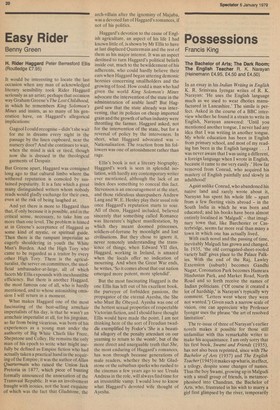Easy Rider
Benny Green
H. Rider Haggard Peter Berresford Ellis (Routledge £7.95) It would be interesting to locate the last occasion when any man of acknowledged literary sensibility took Rider Haggard seriously as an artist; perhaps that occasion way Graham Greene's The Lost Childhood, in which he remembers King Solomon's Mines and insists, as so many of his generation have, on Haggard's allegorical implications: Gagool I could recognise — didn't she wait for me in dreams every night in the passage by the linen cupboard, near the nursery door? And she continues to wait, when the mind is sick or tired, though now she is dressed in the theological garments of Despair.
But Greene apart, Haggard was consigned long ago to that cultural limbo where the withered reputation is consoled by sustained popularity. It is a fate which a great many distinguished writers whom nobody reads would gladly exchange for their own, even at the risk of being laughed at.
And yet there is more to Haggard than that, if only because it is possible, and in the critical sense, necessary, to take him on more than one level. The problem is hinted at in Greene's acceptance of Haggard as some kind of mystic, or spiritual guide. Then there is the rampant imperialist so eagerly shouldering in youth the White Man's Burden. And the High Tory who came to be regarded as a traitor by every other High Tory. There is the agriculturalist, the server on committees, the unofficial ambassador-at-large, all of which facets Mr Ellis expounds with inexhaustible efficiency. But there is another Haggard, the most famous one of all, who is hardly mentioned, and to whose astonishing omission I will return in a moment.
What makes Haggard one of the most fascinating of the best-selling armchair imperialists of his day, is that he wasn't an armchair imperialist at all, for his jingoism, so far from being vicarious, was born of his experiences as a young man under the authority of Big White Chiefs like Frere, Shepstone and Colley. He remains the only man of his epoch to write what might usefully be defined as Empire fiction who had actually taken a practical hand in the acquiring of the Empire; it was the author of Allan Quartermain who raised the Union Jack Pretoria in 1877, which piece of bunting formally announced the annexation of the Transvaal Republic. It was an involvement fraught with ironies, not the least exquisite of which was the fact that Gladstone, the arch-villain after the ignominy of Majuba, was a devoted fan of Haggard's romances, if not of his politics.
Haggard's devotion to the cause of English agriculture, an aspect of his life I had known little of, is shown by Mr Ellis to have at last displaced Quatermain and the rest of them as his major interest. It was an aspect destined to turn Haggard's political beliefs inside out, much to the bewilderment of his adherents, who could hardly believe their ears when Haggard began uttering demonic heresies concerning smallholders and the growing of food. How could a man who had given the world King Solomon's Mines advocate the intervention of the state in the administration of arable land? But Haggard saw that the state already was intervening, that its policies on cheap imported grain and the growth of urban industry were throttling the farmer. Haggard asked, not for the intervention of the state, but for a reversal of policy by the interveners. In short, what Haggard advocated was — Nationalisation. The reaction from his followers was one of astonishment rather than rage.
Ellis's book is not a literary biography; Haggard's work is seen in splendid isolation, with hardly any contemporary writer ever mentioned, although the lack of an index does something to conceal this fact. Stevenson is an encouragement at the start, and those ridiculous sharepushers Andrew Lang and W. E. Henley play their usual role once Haggard's reputation starts to soar. All of them, Haggard included, believed sincerely that something called Romance was literature's highest manifestation, by which they meant doomed princesses, soldiers-of-fortune by moonlight and lost civilisations. But they chose to ignore it, never remotely understanding the transience of things; when Edward VII dies, Haggard, working in Ireland, is amazed when the locals offer no indication of mourning. And when the Great War ends, he writes, 'So it comes about that out nation emerged more potent, more splendid'.
But the most fascinating Haggard is the one Ellis has left out of his excellent book, the purveyor of forbidden passions, the propagator of the eternal Ayesha, the She who Must Be Obeyed. Ayesha was one of the hottest sexual properties of respectable Victorian fiction, and I should have thought Ellis would have made the point. I am not thinking here of the sort of Freudian twaddle exemplified by Fodor's 'She is a beautiful allegory of the penalty attendant on our yearning to return to the womb', but of the more direct and unarguable truth that She, the most enduring of Haggard's romances, has won through because generations of male readers, whether they be Mr Gladstone or the suburban sparks who rushed to the cinemas a few years ago to see Ursula Andress in the role, will always find time for an irresistible vamp. I would love to know what Haggard's devoted wife thought of Ayesha.






























 Previous page
Previous page